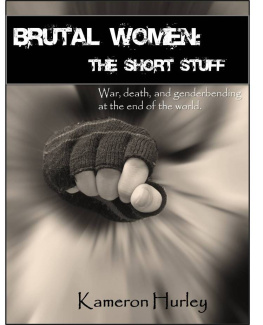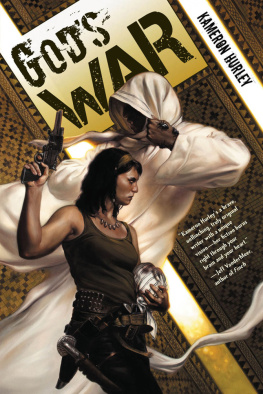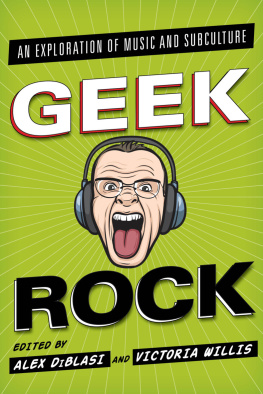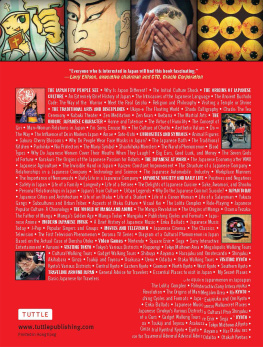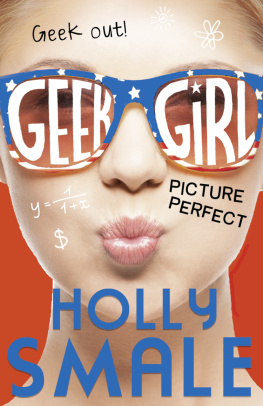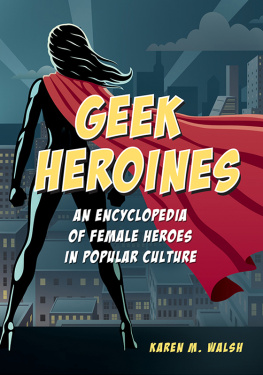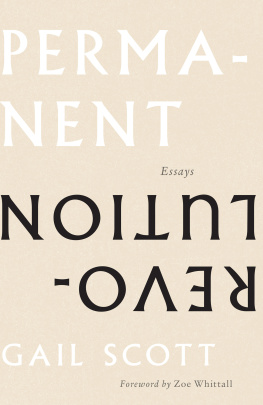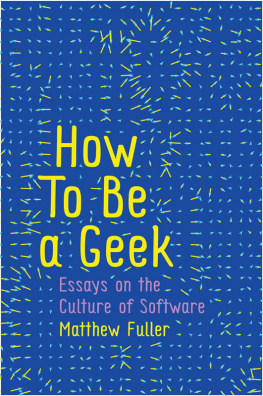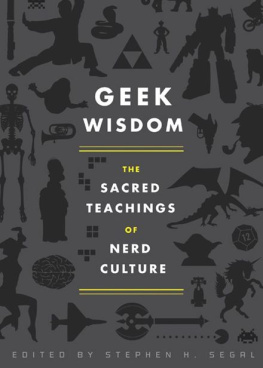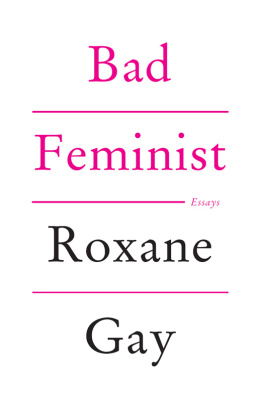
The author and publisher have provided this e-book to you without Digital Rights Management software (DRM) applied so that you can enjoy reading it on your personal devices. This e-book is for your personal use only. You may not print or post this e-book, or make this e-book publicly available in any way. You may not copy, reproduce, or upload this e-book, other than to read it on one of your personal devices.
Copyright infringement is against the law. If you believe the copy of this e-book you are reading infringes on the authors copyright, please notify the publisher at: us.macmillanusa.com/piracy.
For Joanna
Theres a revolution going on. Were seeing some of the loudest and most violent of its battles inside a seemingly strange place: fan and creator communities of science fiction and fantasy media. These are battles fought in the comments sections of personal and professional websites, on subreddits like /r/fantasy, and, increasingly, in popular news outlets ranging from NPR to the New York Times. The fandoms that have arisen around science fiction and fantasy novels, games, and other media, once confined to fan-run magazinesonline and offand old LiveJournal communities and listservs, have gone mainstream. Journalists on the outside like to call this the Age of the Geek. Inside geek circles, what geekiness is, and how its defined, is becoming an even more hotly contested issue. Mainstream coverage of these growing pains has focused primarily on predominantly white, male geeks suffering a keen sense of nostalgia for the days when they were the assumed default audience for pulp novels and video games.
Yet women have always been geeks. They have been gamers and writers, comic book readers and passionate fans, from Conan the Barbarian to Star Trek. So why the new backlash? Because the numbers of women in these spaces have indeed grown in the last decade. Women have gone from making up 25 to 30 percent of gaming audiences just ten years ago to over 50 percent of video game players, and 40 to 50 percent of creators. Forty percent of science fiction authors are female, as are 60 percent of readers of speculative genres. Their voices, their presence, cannot be denied or explained away with talks of tokenism and exceptionalism. Women are here.
Women like me.
Human beings are, if nothing else, dedicated to upholding their narrative of the way the world is supposed to be, whether or not that world ever truly existed. If youre wondering why theres been an explosive backlash against women in geek and popular culture, this is the reason: the status quo and mainstream ideas about how the world works must be maintained by those who benefit most from it, and to do that, voices that speak of actual reality, or a different future, must be silenced.
That means me. And probably you. And a lot of the people you know. It means silencing at least half of the world.
I have been fighting this narrative for a long time, because it is not limited to popular culture. Popular culture is simply a microcosm of our wider culture, and we live in a culture that doesnt like to uplift female voices without a fight. The fight takes its toll. I am imperfect, and I am tired, and now that Im in my midthirties Ive been able to see the cycles of rage and erasure happen time and time again, and yes, it gets frustrating.
As opportunities for women in geek spaces have risen, so too has the backlash. Anita Sarkeesians popular Tropes vs. Women in Video Games video education series about problematic depictions of women in video games raised nearly $160,000 on Kickstarter and simultaneously made her one of the largest targets of abuse on the internetno small feat considering how vast the rage of the online beast can be. A single forum post by a spurned ex-boyfriend triggered an internet deluge of threats against game creator Zoe Quinn, which rapidly organized itself under the Gamergate hashtag, an online mob ostensibly about ethics in gaming journalism that primarily targeted women for harassment. Riding on the coattails of Gamergate came SadPuppyGate, an organized backlash against the increasing number of women and literary books showing up on popular science fiction and fantasy awards ballots, in particular the prestigious Hugo Awards. In 2011, 2012, and 2013, women made up nearly 40 percent of the nominees on the Hugo Awards ballot. But by aligning themselves with the Gamergate movement to stuff ballot boxes with a slate of pre-approved candidates, a small group of mostly white, male, conservative writers (calling themselves the Sad Puppies) was able to vote nearly all of their nominees onto the Hugo Award ballot for the 2014 nomination period. Due to the gaming of the vote, women nominees dropped to 20 percent of the overall total, the lowest number since 2009. The slate of nominees included nine works associated with a small press founded by a far-right extremist who doesnt believe women should have the right to vote, and another from a press called (unironically) the Patriarchy Press. The slate was summarily dismissed by the final voters, and not a single slated work except Guardians of the Galaxy (which was the only work likely to have made the ballot without the slate) was awarded a trophy, and every other slated work finished dead last under No Award.
The hate campaigns dont work. The slates dont work. Yet these targeted campaigns of hate and abuse have served their purpose in another way: they have driven some women of all races, men of color, and queer, trans, and other nonbinary people away from online spaces and discouraged them from writing in speculative fiction genres.
But not all of us. Not all of us. Because telling someone to be quiet on the internet to avoid abuse and harassment is like telling women that the best way to avoid being raped is not to go outside, and there are many more of us who wont be silenced, because fuck that.
What the organized haters never anticipated was that their abuse would also inspire its own resistance. I was raised on stories of a grandmother who lived in Nazi-occupied France. My great-grandfather was part of the resistance. I studied resistance movements in Southern Africa as part of my masters degree. When somebody pushes back, I know how to push harder. I have a lot of perspective on what real state terror looks like, and online abuse still pales in comparison.
This vitriolic backlash inspired and continues to inspire a generation of passionate fans and creators who refuse to be silenced.
Im one of them.
One of many.
What are we risking by speaking up? Everything, certainly. But the far riskier business is not speaking up at all. The riskier future is the one where we all fear a madman incensed by something he read online plowing a car into our house more than we fear being hit by a random bus on the street. I am sane enough to note that the odds of the latter are still greater than the odds of the former.
The truth is that much of the hate directed at us is about fear of us. As both an essayist and a science fiction and fantasy novelist, I write about and for the future. I talk about the past to remind us that what we believe has always been truethat men and women are somehow static categories, or that men in power has always been the default, or that same-sex love affairs were always taboohas not always been thus. Who we are, how we define ourselves, how we structure our societies has been vastly mutable over time. I talk about that because if we assume the world has always been one way, then change is not only scarier (But what will happen if we change?!), but appears to be impossible (Its never been done!). The truth is change happens all the time. Its happening all around us. As I write this, the U.S. Supreme Court has recently ruled that same-sex marriage is now the law of the land. If youd told me twenty years ago that Id see that before I was forty, Id have laughed.
Next page

